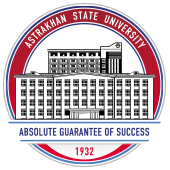Career Planning: from Adaptation to Studies up to Employment
 23.06.2014
23.06.2014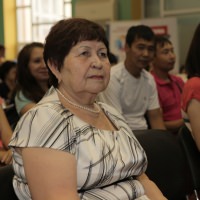
Real guarantees of graduates’ good employment are an essential competitive advantage of any university at the market of educational services. A positive image of a university and its close interaction with top employers operating in various fields – this is what attracts potential students now. According to statistic data, 99 % of Astrakhan State University’s 2013 graduates have been employed. Ms. Saniya Akhmedova, Chief of the Center of Career Planning of ASU, has told us how Astrakhan State University improves its positions at two markets at once – the labor market and the market of specialists.
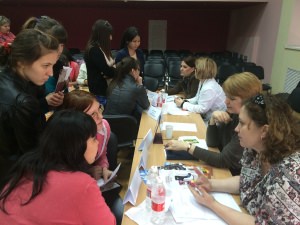 The Center of Career Planning helps our University react rapidly to social and economic changes that take place in our society; it also helps correct the policy of students’ training. The Center has been operating since 2006. It is not a closed or a merely local body: it is an official regional Center that assists graduates to find a job. It assumes leading positions among 42 similar centers, being one of the top five.
The Center of Career Planning helps our University react rapidly to social and economic changes that take place in our society; it also helps correct the policy of students’ training. The Center has been operating since 2006. It is not a closed or a merely local body: it is an official regional Center that assists graduates to find a job. It assumes leading positions among 42 similar centers, being one of the top five.
Together with the Bauman Moscow State Technical University’s Interregional Coordination Analytical Center that deals with graduates’ employment and adaptation to the labor market, ASU’s Center of Career Planning performs annual monitoring of our graduates’ employment; it helps forecast their opportunities and risks in details. Students’ preparation to working under real conditions already during their studies, accompanying undergraduates to help them present themselves at the labor market, arrangement of fairs of vacancies and meeting with employers – this list of activities performed by the Center is still far from being complete.
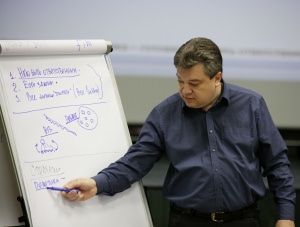 Actually, any student may begin to build their careers already since the first year of studies. Young people ought to be aware that employers need specialists who are able to work productively and enhance their professional skills regularly. “When they choose a specialty to study, they don’t always understand its essence completely; they aren’t fully aware in what particular sphere they’d have to work upon their graduation”, Ms. Akhmedova speculates. “That’s why one of our top priority activities is to develop individual competencies of a future specialist by means of their professional self-orientation and a deep immersion into their future professions”.
Actually, any student may begin to build their careers already since the first year of studies. Young people ought to be aware that employers need specialists who are able to work productively and enhance their professional skills regularly. “When they choose a specialty to study, they don’t always understand its essence completely; they aren’t fully aware in what particular sphere they’d have to work upon their graduation”, Ms. Akhmedova speculates. “That’s why one of our top priority activities is to develop individual competencies of a future specialist by means of their professional self-orientation and a deep immersion into their future professions”.
During the last eight years, the Center realizes the program “Careers Stages” that includes two parts. The first part comprises psychological aspects of professional activities, as well as teambuilding issues; it is younger students who are its target. The second part of the program is aimed at older students; it is concentrated on fundamentals of business planning. Business coaches work with students at both stages; ASU’s faculty, officials from the regional youth employment agency, and employers act as mentors.
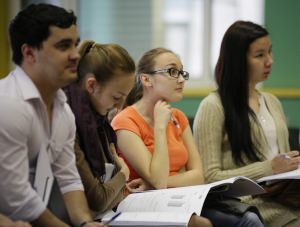 Professional qualification of a graduate is not a constant value; it depends on each and every particular case of employment, on the specifics of education obtained. As for the set of personal qualities that are of top priority for employers, it has been constant for a long time: being goal-oriented, being communicable, being ready to assume responsibility, ability to work hard, and a tendency to improve your qualities regularly. Questionnaires help any student reveal which of these qualities are well-developed and which ones still need to be developed; they help determine profiles of competencies and ways of further individual work with students. The signed agreement with the “Humanitarian Technologies” Testing Center of Lomonosov Moscow State University helps ASU’s Center of Career Planning apply the Professional Career software to perform a profound analysis of potential strengths and weaknesses of each and every future graduate.
Professional qualification of a graduate is not a constant value; it depends on each and every particular case of employment, on the specifics of education obtained. As for the set of personal qualities that are of top priority for employers, it has been constant for a long time: being goal-oriented, being communicable, being ready to assume responsibility, ability to work hard, and a tendency to improve your qualities regularly. Questionnaires help any student reveal which of these qualities are well-developed and which ones still need to be developed; they help determine profiles of competencies and ways of further individual work with students. The signed agreement with the “Humanitarian Technologies” Testing Center of Lomonosov Moscow State University helps ASU’s Center of Career Planning apply the Professional Career software to perform a profound analysis of potential strengths and weaknesses of each and every future graduate.
According to preliminary data, the risk not to find a job among ASU’s 2014 graduates exists for 58 people of over 1, 500. “We can obtain such statistic data, as we’re in regular contact with Departments”, Ms. Akhmedova says. “They provide us with forecast data on employed students’ percentage rates in different specialties. We pay special attention to undergraduates. Those of them who may face unemployment are under our special control: we invite them to fairs of vacancies; we inform them of our web resources where over 800 vacancies are offered”. By the way, six to seven fairs of vacancies are held at ASU every year.
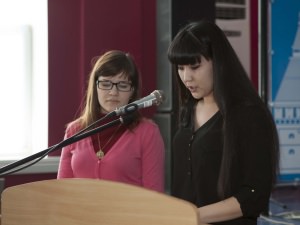 Municipalities and regional bodies place “government orders” quite often. “Our students met reps of the Regional Fishery Agency”, Mr. Akhmedova reflects. “The Agency launched a contest to assume civil service positions: they needed biologists and lawyers. Our folks were invited to take part in it: the best of them are being selected now”.
Municipalities and regional bodies place “government orders” quite often. “Our students met reps of the Regional Fishery Agency”, Mr. Akhmedova reflects. “The Agency launched a contest to assume civil service positions: they needed biologists and lawyers. Our folks were invited to take part in it: the best of them are being selected now”.
Dr. Nadezhda Semchuk, Dean of ASU’s Agrarian Department, also shares experience in cooperation between students and legal authorities: “Our Regional Ministry of Agriculture monitors each and every graduate to employ all the young specialists in the agricultural sphere. Reps of the Ministry meet our students regularly to solve issues of practical training and employment”. According to the Dean, the result of such joint work is as follows: 87.5 % of zootechnicians and 80 % of veterinarians who graduated from ASU last year work in the field that corresponds to their qualifications.
As everybody knows, demand for high-level specialists has always exceeded demand. That is especially relevant for graduates of pedagogical, ICT, and mass media specialties. Despite the steady stereotype, lawyers are of especially high demand: police authorities and emergency situations management bodies, federal bailiffs, customs, and other organizations offer such vacancies.
Then why do some graduates keep on speaking about unemployment? (There are about 40 people among present-year graduates who are facing such problems). The answer is simple: most of them are not well-prepared to meet the tough conditions of the labor market; they set too high demands and expect to get a high salary and a good position right at once.
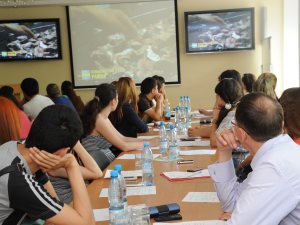 No doubt there is positive dynamics in employment of young specialists who got education at our University. In particular, if there were about 20 % unemployed graduates in 2006, now there will be only 5 % this year. “Such a growth in young specialists’ employment could be explained with changes that take place at the regional labor market”, Ms. Akhmedova comments. “Besides, graduates change themselves: they are beginning to think about their careers already at the beginning of their studies. For example, if young people used to avoid serving in the army, now they’re aware that military service is prestigious and favors their further employment and career growth”.
No doubt there is positive dynamics in employment of young specialists who got education at our University. In particular, if there were about 20 % unemployed graduates in 2006, now there will be only 5 % this year. “Such a growth in young specialists’ employment could be explained with changes that take place at the regional labor market”, Ms. Akhmedova comments. “Besides, graduates change themselves: they are beginning to think about their careers already at the beginning of their studies. For example, if young people used to avoid serving in the army, now they’re aware that military service is prestigious and favors their further employment and career growth”.
Annual monitoring shows that about 95 % of ASU’s graduates remain to work in Astrakhan Region. It proves that Astrakhan State University meets the goal of training worthy specialists for the labor market successfully.
Russian original information source: N.I. Kirillova (the Innovative Laboratory of Information Linguistics of ASU)
Russian original photo source: the Center of Career Planning of ASU
